Event Management And Performance
38 Pages9857 Words56 Views
Added on 2023-05-04
About This Document
In this assignment we will discuss about event management and performance and below are the summaries point:-
- Event management has become a global industry and requires project management skills for success
- The success of event management firms depends on factors like managerial skills, credit facilities, and supply chain networks
- The study focuses on the top five event companies in Kathmandu, Nepal
- Objectives of the study are to examine the relationship between management skills, supply chain networks, and credit facilities with performance of event management in Kathmandu, Nepal
- Events management is a significant communication and marketing tool for both large and small enterprises in Nepal
- The COVID-19 pandemic has had a significant impact on the industry's productivity
- The study aims to discover the reasons for the poor handling of events management in Kathmandu, Nepal and offer recommendations for conscious value creation.
Event Management And Performance
Added on 2023-05-04
ShareRelated Documents
TASK 1
AC 1.1 AREA OF RESEARCH: EVENT MANAGEMENT AND PERFORMANCE
TOPIC: A CRITICAL ANALYSIS OF FACTORS AFFECTING THE OVERALL
PERFORMANCE OF EVENT MANAGEMENT COMPANIES IN KATHMANDU,
NEPAL
AC 1.2: AIM, SCOPE AND OBJECTIVE
Due to the obvious large financial investment, many event management businesses in Nepal
struggle to break even. The purpose of this research is to look at the elements that influence the
overall performance of event management firms in Kathmandu, Nepal, and to see if factors like
managerial skills, credit facilities, and supply chain networks have an impact. The study's focus
is restricted to Kathmandu, Nepal. The study will be carried out among event managers of top
five event companies in Kathmandu, Nepal namely Apollo Events and Advertisement Pvt. Ltd,
God Entertainment, Global Events Pvt. Ltd, JST Productions and Devsuits Pvt. Ltd being the
country home of the researcher and as well due to incessant decline in performance experience in
the sector.
A.C 1.3: RESEARCH PROPOSAL
INTRODUCTION
Since festivals and events have grown into a worldwide industry, event management can no
longer be done on ad hoc basis. Festivals and events have a huge impact all around the country.
The sector now encompasses anything from the Olympics to a ten-person breakfast meeting..
Many sectors, charitable organizations, and interest groups will conduct large events to promote
themselves, create commercial contacts, raise money, or commemorate something. Festivals,
events, and conferences all benefit from project management. While actually starting the event,
1
AC 1.1 AREA OF RESEARCH: EVENT MANAGEMENT AND PERFORMANCE
TOPIC: A CRITICAL ANALYSIS OF FACTORS AFFECTING THE OVERALL
PERFORMANCE OF EVENT MANAGEMENT COMPANIES IN KATHMANDU,
NEPAL
AC 1.2: AIM, SCOPE AND OBJECTIVE
Due to the obvious large financial investment, many event management businesses in Nepal
struggle to break even. The purpose of this research is to look at the elements that influence the
overall performance of event management firms in Kathmandu, Nepal, and to see if factors like
managerial skills, credit facilities, and supply chain networks have an impact. The study's focus
is restricted to Kathmandu, Nepal. The study will be carried out among event managers of top
five event companies in Kathmandu, Nepal namely Apollo Events and Advertisement Pvt. Ltd,
God Entertainment, Global Events Pvt. Ltd, JST Productions and Devsuits Pvt. Ltd being the
country home of the researcher and as well due to incessant decline in performance experience in
the sector.
A.C 1.3: RESEARCH PROPOSAL
INTRODUCTION
Since festivals and events have grown into a worldwide industry, event management can no
longer be done on ad hoc basis. Festivals and events have a huge impact all around the country.
The sector now encompasses anything from the Olympics to a ten-person breakfast meeting..
Many sectors, charitable organizations, and interest groups will conduct large events to promote
themselves, create commercial contacts, raise money, or commemorate something. Festivals,
events, and conferences all benefit from project management. While actually starting the event,
1
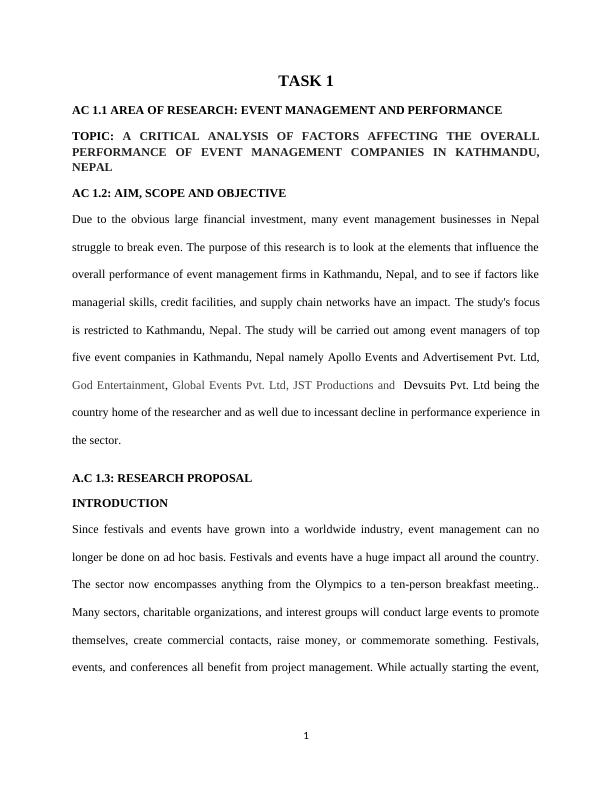
event management include researching the brand, determining the target audience, organizing
logistics, and coordinating technological issues (Kilkenny, 2011).
The ability to provide a return on investment is one of the primary incentives for the event
industry; nevertheless, the success or failure of event management is dependent on supply chain
networks. There are several reasons for planning events, as well as numerous techniques for
doing it. Host communities are frequently the source of variety. Differences in the form and
function of events will be explained by differences in the political, economic, and technical
conditions of different nations. Global challenges including increased migration, aging
populations, terrorist fears, and climate change have resulted in a lot of convergence in event
management approaches all throughout the world.
Many urban areas host festivals honoring the traditions of migrant communities, as well as music
performances and other forms of entertainment. High levels of security and sustainable event
management principles are becoming more connected with planning international-standard
events, regardless of the location in which they are hosted. Organizing logistics, understanding
the complexity of a brand, establishing the company's target audience, and expressing the event's
concept are all part of event management in Nepal.
Award ceremonies, fashion displays, weddings, and release parties, as well as collaborative
activities like press conferences, are examples of corporate hospitality events. For both large and
small enterprises in Nepal, the event management industry is recognized as one of the most
significant communication and marketing tools. Every business is adopting event management,
with philanthropic groups using it to promote themselves, raise funds, celebrate, and build
commercial ties. Every client wants a well-organized and successful event for marketing
2
logistics, and coordinating technological issues (Kilkenny, 2011).
The ability to provide a return on investment is one of the primary incentives for the event
industry; nevertheless, the success or failure of event management is dependent on supply chain
networks. There are several reasons for planning events, as well as numerous techniques for
doing it. Host communities are frequently the source of variety. Differences in the form and
function of events will be explained by differences in the political, economic, and technical
conditions of different nations. Global challenges including increased migration, aging
populations, terrorist fears, and climate change have resulted in a lot of convergence in event
management approaches all throughout the world.
Many urban areas host festivals honoring the traditions of migrant communities, as well as music
performances and other forms of entertainment. High levels of security and sustainable event
management principles are becoming more connected with planning international-standard
events, regardless of the location in which they are hosted. Organizing logistics, understanding
the complexity of a brand, establishing the company's target audience, and expressing the event's
concept are all part of event management in Nepal.
Award ceremonies, fashion displays, weddings, and release parties, as well as collaborative
activities like press conferences, are examples of corporate hospitality events. For both large and
small enterprises in Nepal, the event management industry is recognized as one of the most
significant communication and marketing tools. Every business is adopting event management,
with philanthropic groups using it to promote themselves, raise funds, celebrate, and build
commercial ties. Every client wants a well-organized and successful event for marketing
2
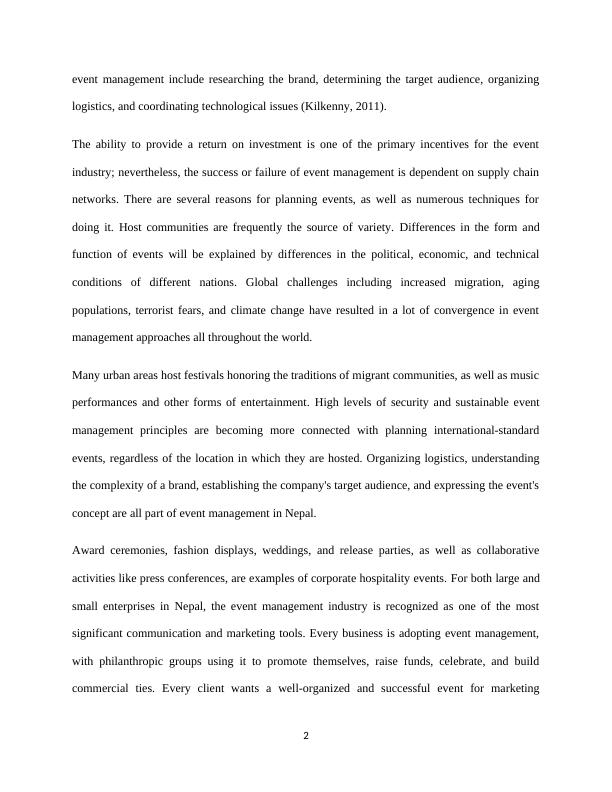
programs such as grand openings and product launches. However, many event management
businesses in Nepal continue to struggle to meet their targets and aims as a result of the corona
virus pandemic (COVID-19), which has had a significant impact on the industry's productivity.
As a result, the current study aims to look at the elements that influence event management firms
in Kathmandu, Nepal.
OBJECTIVE
The main objective of the study is to examine the factors affecting event management companies
in Kathmandu, Nepal. Other specific objectives are to:
1. examine the relationship between management skills and performance of event
management in Kathmandu, Nepal.
2. investigate the relationship between supply chain networks and performance of event
management in Kathmandu, Nepal.
3. determine the relationship between credit facility and performance of the event
management in Kathmandu, Nepal.
STATEMENT OF PROBLEM
Events management in Kathmandu, Nepal, has been handled badly on several occasions
throughout the years. This empirical study aims to discover why, as well as offer
recommendations on the role and effectiveness of event management businesses in assuring
conscious value creation. Since it is impossible to completely avoid deviations from plans with
suppliers during event management, the negative impact of deviations must be minimized.
3
businesses in Nepal continue to struggle to meet their targets and aims as a result of the corona
virus pandemic (COVID-19), which has had a significant impact on the industry's productivity.
As a result, the current study aims to look at the elements that influence event management firms
in Kathmandu, Nepal.
OBJECTIVE
The main objective of the study is to examine the factors affecting event management companies
in Kathmandu, Nepal. Other specific objectives are to:
1. examine the relationship between management skills and performance of event
management in Kathmandu, Nepal.
2. investigate the relationship between supply chain networks and performance of event
management in Kathmandu, Nepal.
3. determine the relationship between credit facility and performance of the event
management in Kathmandu, Nepal.
STATEMENT OF PROBLEM
Events management in Kathmandu, Nepal, has been handled badly on several occasions
throughout the years. This empirical study aims to discover why, as well as offer
recommendations on the role and effectiveness of event management businesses in assuring
conscious value creation. Since it is impossible to completely avoid deviations from plans with
suppliers during event management, the negative impact of deviations must be minimized.
3
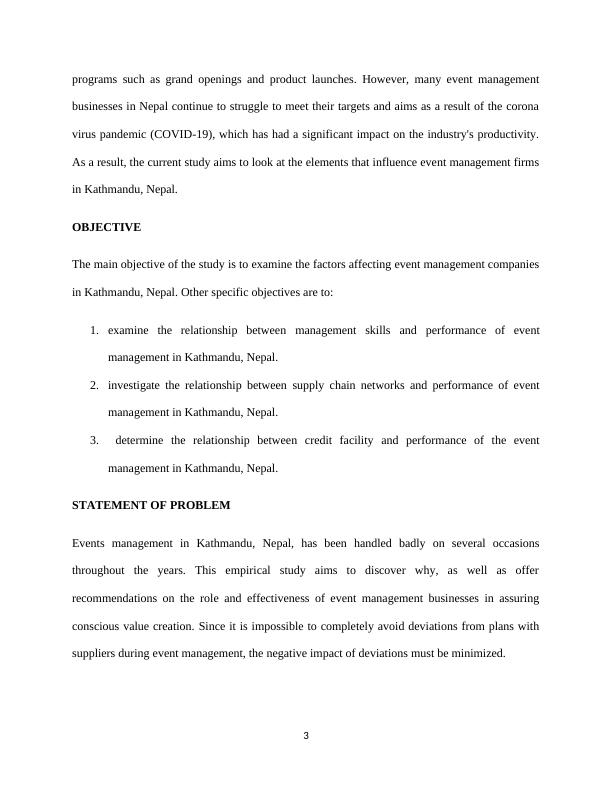
While research into different events-related phenomena has increased significantly since the late
1980s, there is still a knowledge gap in understanding of the social impact of events and festivals
on host communities and beyond. In recent years, there has been a lot more scholarly focus on
whether event-driven urban strategies are meeting the needs of direct and indirect 'beneficiaries’.
(Whitson and Horne, 2006). The average planner isn't necessarily fluent in technical jargon. It's
not as if event planners need to know how to run a sound board or set up equipment. They are,
however, the link between individuals who speak on stage or prepare presentations for
presentation and the audio visual professionals who make it all possible, and they are, sadly, the
weak link in the chain.
Planners need to know what they're doing. In the previous ten years, the meetings and event
business has advanced significantly in terms of professionalism. In this field, it is past time for
knowledge. It is this research gap that the current study intends to fill by studying the factors
affecting event management companies in Kathmandu, Nepal.
RESEARCH QUESTIONS
In line with identified statement, the following research questions are formulated to guide the
study:
1. What is the relationship between management skills and performance of event
management in Kathmandu, Nepal?
2. What is the relationship between supply chain networks and performance of event
management in Kathmandu, Nepal?
3. What is the relationship between credit facility and performance of the event
management in Kathmandu, Nepal?
4
1980s, there is still a knowledge gap in understanding of the social impact of events and festivals
on host communities and beyond. In recent years, there has been a lot more scholarly focus on
whether event-driven urban strategies are meeting the needs of direct and indirect 'beneficiaries’.
(Whitson and Horne, 2006). The average planner isn't necessarily fluent in technical jargon. It's
not as if event planners need to know how to run a sound board or set up equipment. They are,
however, the link between individuals who speak on stage or prepare presentations for
presentation and the audio visual professionals who make it all possible, and they are, sadly, the
weak link in the chain.
Planners need to know what they're doing. In the previous ten years, the meetings and event
business has advanced significantly in terms of professionalism. In this field, it is past time for
knowledge. It is this research gap that the current study intends to fill by studying the factors
affecting event management companies in Kathmandu, Nepal.
RESEARCH QUESTIONS
In line with identified statement, the following research questions are formulated to guide the
study:
1. What is the relationship between management skills and performance of event
management in Kathmandu, Nepal?
2. What is the relationship between supply chain networks and performance of event
management in Kathmandu, Nepal?
3. What is the relationship between credit facility and performance of the event
management in Kathmandu, Nepal?
4
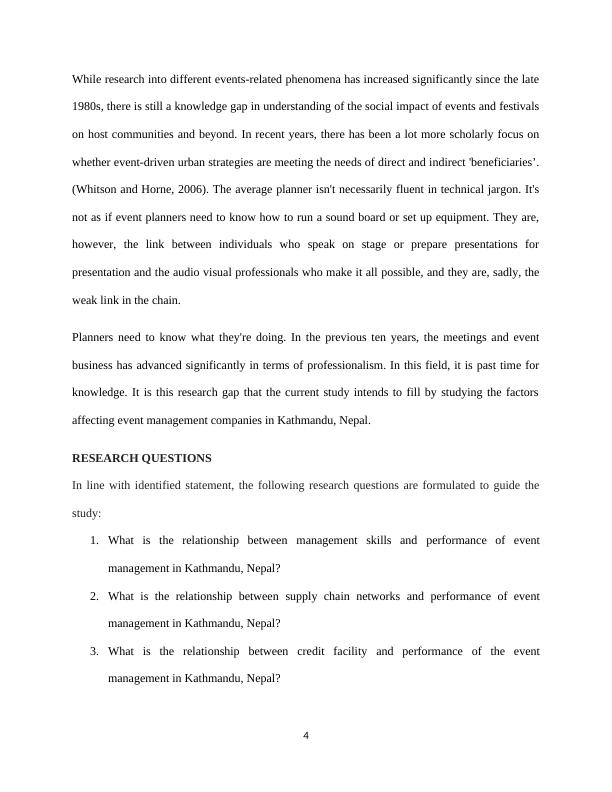
LITERATURE REVIEW
This section will entail the following discussions:
Event management and performance
Management skills and performance of event management
Supply chain networks and performance of event management
Sccess to credit facility and performance of the event management
Theoretical Framework
This study will be anchored on the resource-based theory which provides an important
framework for explaining and predicting the basis of a company’s’ ability to compete and
perform.
RESEARCH METHOD
Both qualitative and quantitative methodologies will be used in the study. The purpose of this
study is to determine the characteristics that impact the performance of events management firms
in Kathmandu, Nepal, using a descriptive survey research technique. Descriptive research
approach is used to accurately and factually reflect the facts and characteristics of a certain group
or topic (Richey and Klein, 2007). The study's target demographic was Nepalese event planners.
The demographic for the study will be centered on event planners in Kathmandu who specialize
in event planning and management. Twenty respondents from five (5) event management
businesses in Kathmandu, Nepal made up the study's population. The selection criteria were that
four respondents represented each of the five organizations, and those chosen as respondents
were tasked with assuring the company' overall effectiveness. A census study will be carried out
on five major event management companies in Kathmandu, Nepal. The researcher chose this
5
This section will entail the following discussions:
Event management and performance
Management skills and performance of event management
Supply chain networks and performance of event management
Sccess to credit facility and performance of the event management
Theoretical Framework
This study will be anchored on the resource-based theory which provides an important
framework for explaining and predicting the basis of a company’s’ ability to compete and
perform.
RESEARCH METHOD
Both qualitative and quantitative methodologies will be used in the study. The purpose of this
study is to determine the characteristics that impact the performance of events management firms
in Kathmandu, Nepal, using a descriptive survey research technique. Descriptive research
approach is used to accurately and factually reflect the facts and characteristics of a certain group
or topic (Richey and Klein, 2007). The study's target demographic was Nepalese event planners.
The demographic for the study will be centered on event planners in Kathmandu who specialize
in event planning and management. Twenty respondents from five (5) event management
businesses in Kathmandu, Nepal made up the study's population. The selection criteria were that
four respondents represented each of the five organizations, and those chosen as respondents
were tasked with assuring the company' overall effectiveness. A census study will be carried out
on five major event management companies in Kathmandu, Nepal. The researcher chose this
5
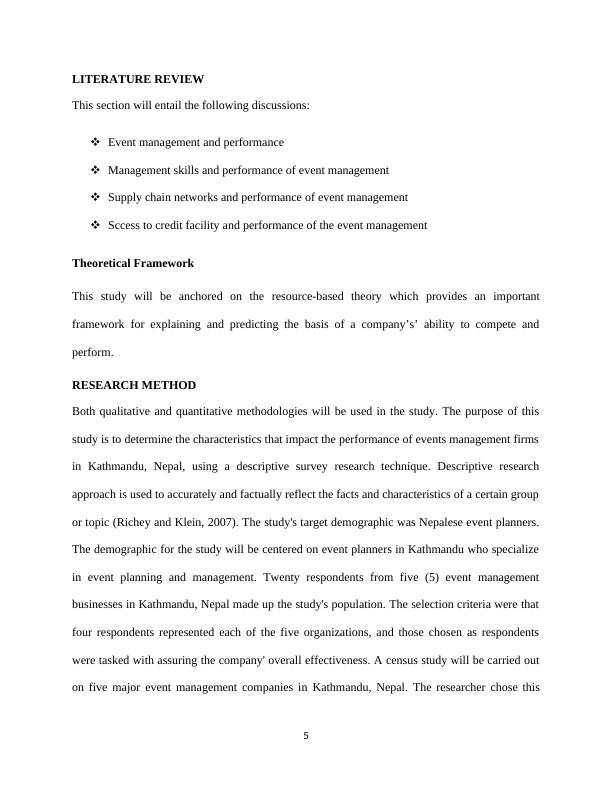
population because the population will make it easier to extract the research sample which
adequately represents event planners in Nepal.
Each business will employ a sample size of four marketing experts. According to Mugenda
(2011), a sample size must be big enough to provide reliable estimates of population parameters
and obtain estimations. A tiny sample will yield reliable estimates of the measure if the
population is considerably homogeneous. In addition, the sample size is frequently constrained
by available resources. The data for this study was gathered from both primary and secondary
sources. The questionnaire will be used to obtain primary data from respondents for the research.
In accordance with Covid 19 regulations and, most significantly, due to distance, the
questionnaire will be administered through google form, delivered by Whatsapp, and mailed.
The data will be presented and analyzed using frequency counts, tables, and percentages, and the
study's conclusions will be discussed as a result.
1.4: SUCCESS CRITERIA
The success criteria for a project are the variables that determine whether it succeeds or fails.
The project's success is essential in the business and educational sectors. How success is assessed
is influenced by stakeholder perceptions. They must make their own choices. All initiatives must
meet their purpose, vision, and performance goals. Management and development should have
distinct objectives. The project's completion will be determined by whether or not the study's
stated objectives are met. One of the major way of achieving the objectives of the study is to
ensure that SMART objective are formulated. SMART which is an acronym for specific,
measurable, achievable, realistic and time bound assist many business organizations/researchers
in ensuring that objectives formulated are achieved. For the purpose of this study, the formulated
6
adequately represents event planners in Nepal.
Each business will employ a sample size of four marketing experts. According to Mugenda
(2011), a sample size must be big enough to provide reliable estimates of population parameters
and obtain estimations. A tiny sample will yield reliable estimates of the measure if the
population is considerably homogeneous. In addition, the sample size is frequently constrained
by available resources. The data for this study was gathered from both primary and secondary
sources. The questionnaire will be used to obtain primary data from respondents for the research.
In accordance with Covid 19 regulations and, most significantly, due to distance, the
questionnaire will be administered through google form, delivered by Whatsapp, and mailed.
The data will be presented and analyzed using frequency counts, tables, and percentages, and the
study's conclusions will be discussed as a result.
1.4: SUCCESS CRITERIA
The success criteria for a project are the variables that determine whether it succeeds or fails.
The project's success is essential in the business and educational sectors. How success is assessed
is influenced by stakeholder perceptions. They must make their own choices. All initiatives must
meet their purpose, vision, and performance goals. Management and development should have
distinct objectives. The project's completion will be determined by whether or not the study's
stated objectives are met. One of the major way of achieving the objectives of the study is to
ensure that SMART objective are formulated. SMART which is an acronym for specific,
measurable, achievable, realistic and time bound assist many business organizations/researchers
in ensuring that objectives formulated are achieved. For the purpose of this study, the formulated
6
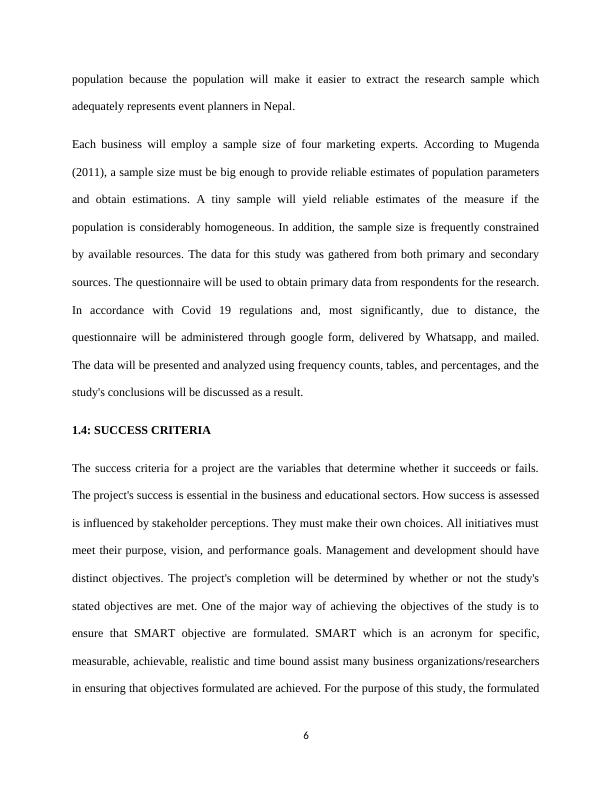
objectives are SMART in order to ensure they are achievable with the stipulated period of time
of conducting the research.
1.5: PROJECT PLAN
Milestones Date Period
Area for research 2022/02/01 3 hours
Explanation of:
-the aim
-scope
-objectives
2022/02/01 – 2022/02/05
2 hour
2 hour
3 hours
Research proposal
- Introduction (background to the study)
- Objectives
- Problem Statement
2022/02/06 – 2022/02/12
2022/02/12 – 2022/02/14
2022/02/15 – 2022/02/17
2 hours
50 minutes
20 minutes
4 hours
Success Criteria 2022/02/20 2 hours
Justification of the research area chosen 2022/02/21 3 hours
Research Questions 2022/02/25 30 minutes
Literature Review
Event management and performance
Management skills and performance of
event management.
Supply chain networks and performance
of event management.
Credit facility and performance of the
event management.
2022/02/25 – 2022/02/26
2022/02/27 – 2022/03/01
2022/03/02 – 2022/03/03
2022/03/04
2 hours
3 hours
2 hours
1 hour
7
of conducting the research.
1.5: PROJECT PLAN
Milestones Date Period
Area for research 2022/02/01 3 hours
Explanation of:
-the aim
-scope
-objectives
2022/02/01 – 2022/02/05
2 hour
2 hour
3 hours
Research proposal
- Introduction (background to the study)
- Objectives
- Problem Statement
2022/02/06 – 2022/02/12
2022/02/12 – 2022/02/14
2022/02/15 – 2022/02/17
2 hours
50 minutes
20 minutes
4 hours
Success Criteria 2022/02/20 2 hours
Justification of the research area chosen 2022/02/21 3 hours
Research Questions 2022/02/25 30 minutes
Literature Review
Event management and performance
Management skills and performance of
event management.
Supply chain networks and performance
of event management.
Credit facility and performance of the
event management.
2022/02/25 – 2022/02/26
2022/02/27 – 2022/03/01
2022/03/02 – 2022/03/03
2022/03/04
2 hours
3 hours
2 hours
1 hour
7
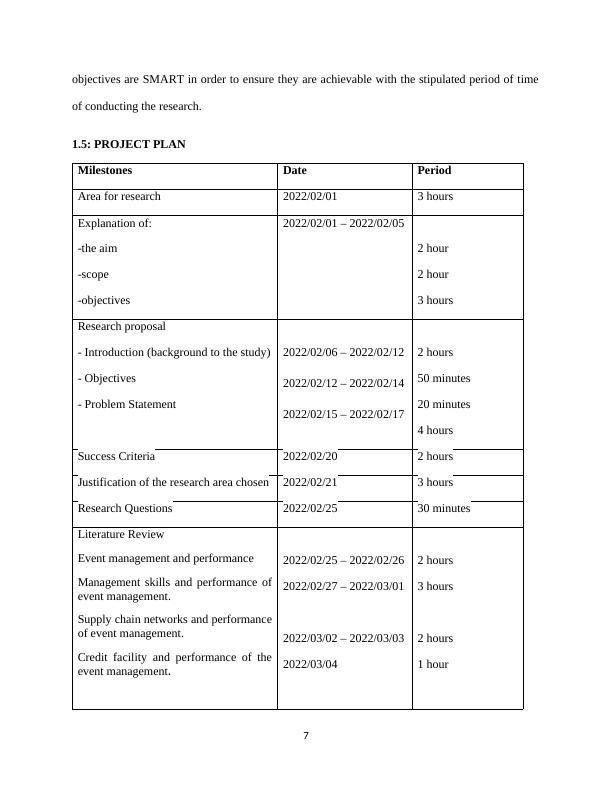
Research methodology
- quantitative study
- secondary data
- research instrument
2022/03/04
2022/03/05
2022/03/05
40 minutes
50 minutes
1 hour
References
AC.1M1: Justification
Event management is becoming more popular across the world, and especially in Kathmandu,
Nepal. There is a multitude of published material and publications available to event planners
that enlighten and teach on a wide range of program planning and sustainability concerns. As a
result, it's essential to think about the aspects that influence the success of event management
companies in Kathmandu, Nepal. To make an event a success, companies must pay close
attention to countless elements during the various stages of event planning, organization,
execution, and evaluation. One of the most challenging challenges in event management is
integrating the event into a specified strategic market notion. The problems of problem-solving
in unforeseen scenarios, risk management, and cultural aspects are other significant factors to
consider, according to the study.
If the study's suggestions are approved or implemented, enterprises will be able to contribute
more to event supply chain management. Better performance and outcomes will inevitably
emerge from greater management and monitoring of any unplanned occurrences within the wider
supply chain ecosystem. The findings of this study contribute to Nepal's limited knowledge of
the elements that influence event management organizations' performance. This research lays the
groundwork for future academics who want to investigate event planning and organizing.
8
- quantitative study
- secondary data
- research instrument
2022/03/04
2022/03/05
2022/03/05
40 minutes
50 minutes
1 hour
References
AC.1M1: Justification
Event management is becoming more popular across the world, and especially in Kathmandu,
Nepal. There is a multitude of published material and publications available to event planners
that enlighten and teach on a wide range of program planning and sustainability concerns. As a
result, it's essential to think about the aspects that influence the success of event management
companies in Kathmandu, Nepal. To make an event a success, companies must pay close
attention to countless elements during the various stages of event planning, organization,
execution, and evaluation. One of the most challenging challenges in event management is
integrating the event into a specified strategic market notion. The problems of problem-solving
in unforeseen scenarios, risk management, and cultural aspects are other significant factors to
consider, according to the study.
If the study's suggestions are approved or implemented, enterprises will be able to contribute
more to event supply chain management. Better performance and outcomes will inevitably
emerge from greater management and monitoring of any unplanned occurrences within the wider
supply chain ecosystem. The findings of this study contribute to Nepal's limited knowledge of
the elements that influence event management organizations' performance. This research lays the
groundwork for future academics who want to investigate event planning and organizing.
8
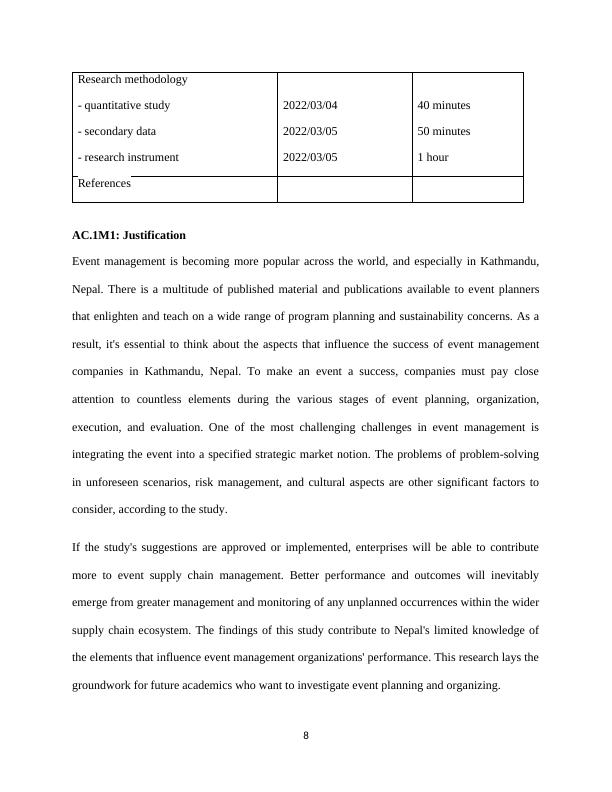
End of preview
Want to access all the pages? Upload your documents or become a member.
Related Documents
Managing Conference and Eventslg...
|15
|4059
|29
Report on Event Environmentlg...
|10
|2185
|218
Event Managementlg...
|9
|2297
|87
Conference Banqueting and Event Managementlg...
|10
|2834
|64
Conference and Banqueting Management :- Assignmentlg...
|11
|3427
|199
Literature Review on Event Management and the Impact of Covid-19 Pandemiclg...
|9
|2598
|129
